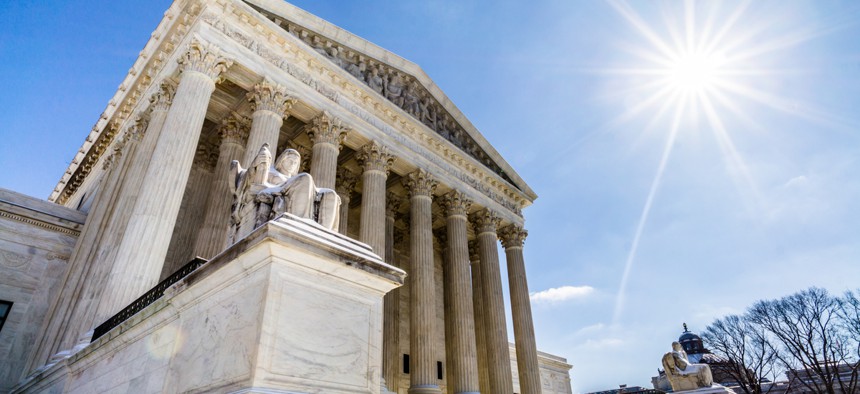A Taxing Issue for State Legislators

The Supreme Court opened up the door for state online sales taxes in its decision in South Dakota v. Wayfair. Shutterstock

Connecting state and local government leaders
COMMENTARY | The Supreme Court’s decision to allow states to tax online commerce beyond their borders should be front and center at the National Conference of State Legislatures meeting this week.
This week, lawmakers from across the country convene in Los Angeles for the National Conference of State Legislatures, where they will hopefully attend to threats to America’s small businesses and consumers from an onslaught of new internet sales tax obligations.
Newly emboldened state tax collectors are aggressively imposing sales tax obligations on businesses with no physical presence within their borders. Online sellers must now absorb the costs of new systems and compliance—including liability for taxes on past purchases where no tax was due at the time of the sale.
This new aggression from tax collectors stems from the U.S. Supreme Court decision last month in South Dakota v. Wayfair. The Wayfair decision obliterated the bright-line test of physical presence that protected hundreds of thousands of small online sellers from the reach of tax collectors across the country.
Tax collectors are now demanding online sellers to collect taxes for over 12,000 differing tax rates and face audits from 46 states. And unlike their brick-and-mortar counterparts, these online sellers are left with few options to protest a far-away state’s policies since they don’t physically exist there. Remote online sellers can’t vote against new taxes and must challenge tax assessments in the remote state’s tax courts.
But it doesn’t have to be this way. State lawmakers can mitigate their tax collectors’ assault on online businesses.
First, states must realize that for every out-of-state seller impacted, there are hundreds of in-state sellers who use the internet to reach customers around the country. And these state businesses need protection from random tax collectors.
Second, states must realize the new taxes coming in aren’t enough to justify significant new burdens on businesses. The Government Accountability Office calculates that actual uncollected sales taxes are much less than previously advertised—less than 1% of total state and local tax revenue.
Third, without limits on tax collectors, states risk further erosion of the physical presence standard that protects businesses from regulatory and tax burdens being imposed on domestic businesses by foreign countries.
Since past is prologue, we know how unrestricted tax collection powers can play out. In the 18th century, the former colonies were impeding commerce among the states through tariffs and duties. That’s why our nation’s founders created the U.S. Constitution, which gives Congress the authority to regulate interstate commerce.
During the 1960s, state tax collectors attempted to force out-of-state catalogs to pay in-state sales taxes. That’s when the Supreme Court first held that states can only tax businesses with a physical presence in their state. That physical presence standard was what the court withdrew in its Wayfair decision.
Now, Congress must act to prevent damage to America’s e-commerce economy. Federal legislation should embrace mandatory minimum simplifications, such as a small business exception, prohibit retroactive tax demands, state-level administration and tax base for all local taxing authorities, require uniform definitions, require tax software paid for by states, grant immunity for unintentional errors made in mapping products to state codes, and preempt states from forcing marketplace facilitators to collect on sales made by others.
In a post-Wayfair world, American consumers and businesses need more than just a “Trust Us” promise from state tax collectors. States have promised to adopt a simpler sales tax system, but we haven’t seen that yet—that’s why some kind of congressional action is needed.
When NCSL meets this week in Los Angeles, we hope its members finally backup their promises with actions that protect all commerce, whether online or off.
Steve DelBianco is president and CEO of NetChoice, a trade association of eCommerce businesses and online consumers.

NEXT STORY: How Chicago’s Poorest Residents Are Driven Into Debt




